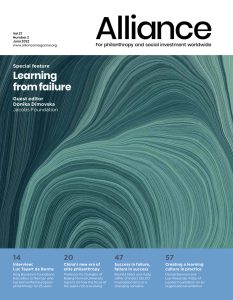We hear the saying ‘You learn from your mistakes’ all our lives – at work and in our private lives. But how helpful is it? And how helpful is learning from failure in the philanthropic environment? In philanthropy, we often operate in highly complex human systems where there is no such thing as simple ‘success’ or ‘failure’. Instead, we need to learn how to deal with a climate of uncertainty and learn along the way through feedback loops.
Learning from mistakes assumes that by acknowledging and evaluating what has gone wrong, failures can be learnt from, and the repetition of mistakes can be prevented. This assumption is widespread in management literature and corporate culture, where it is encouraged to create a culture that accepts failure so that employees feel able to take risks. This approach is also prevalent in the philanthropic environment. Moreover, taking risks is easier for foundations than for some organisations, such as governments. Therefore, foundations should consciously take this path.
In principle, this is true: foundations can take more risks in their grant-making than state organisations or businesses, as they are mainly accountable to the foundation’s purpose and the stewardship of their financial resources. Nevertheless, the premise of learning through mistakes must be viewed in a differentiated and critical manner.

Photo credit: Shutterstock
Common understandings of failure and making mistakes are based on a simplistic worldview. If a complicated technical system such as a large-scale computer does not function as planned by engineers, a comprehensive system check is carried out. This will sooner or later find the binary error.
But can this be transferred to the complex human systems in which most grantmaking foundations operate? The answer is obvious: this is neither possible nor sensible. The big problem with the error-focused approach is the binary ‘good’ or ‘bad’, the ‘success’ or ‘failure’. However, political and social systems cannot be explained and understood in this way. For us as foundations to develop, we may need a different approach.
If mistakes and failures are seen as complex phenomena, there is no longer a simple relationship between human error and its results at the system level. In the work of foundations, it, therefore, makes little sense to search for the causes of failure or success in a traditional binary sense. Rather, the results of funding activities should be scrutinised from different perspectives. Due to the complexity of the systems, this will result in partly overlapping and partly contradictory explanations.
This realisation goes hand in hand with the fact that measuring impact is often not purposeful – even though impact measurements are often demanded, especially in the foundation environment.
But in which direction should foundations work if learning through mistakes and traditional impact measurement does not do justice to the reality of complex social systems?
A central thrust in the future must be to invest in uncertainty. This requires the courage to let go and initiate processes without being able to assess their full impact from the get-go. In their forthcoming book, ‘The Upside of Uncertainty’, INSEAD professor Nathan Furr and entrepreneur Susannah Harmon Furr explore the great possibilities in the unknown, and we must embrace uncertainty as a force for good.
After we make investments, feedback loops can show what the measures have triggered in the complex systems. If a process does not develop in the desired direction, appropriate adjustments follow. For this procedure to work, foundations must leave their offices and their comfort zone and engage with the system actors and those directly affected and involved. They must provide feedback with which the measures are adaptively steered. Crucially, foundations should communicate what they learn in the process, particularly to actors who can accept less uncertainty.
My organisation, Fondation Botnar, is committed to working with young people, our ultimate partners, in an inclusive and participatory way so that they can provide insights and feedback. However, this does not mean that funding measures can be applied arbitrarily to see how things develop. On the contrary, investing in uncertainty requires a very high level of professionalism in its implementation. It needs tailor-made methods to test the hypotheses and targeted feedback loops to evaluate the process and draw conclusions.
At Fondation Botnar, we have recently started implementing this approach as part of our new strategy. One example is our key initiative, OurCity, which aims to support selected cities worldwide to implement coordinated programs that leverage digital technologies and artificial intelligence to transform them into places where young people’s wellbeing and opportunity are secured. So far, we’ve received feedback from young people in Tanga and Cluj-Napoca to see how the initiative improves their wellbeing. We will be applying these learnings to future city launches this Summer.
As leaders of philanthropic organisations, we are best placed to take risks – but we must also do this will great humility. Humility to acknowledge that traditional short-term measures of success and failure are not often adequate when the transformation and systems change journey is often long and arduous, as well as dependent on multiple factors and unknowns. We must also recognise that philanthropic actors can achieve more significant outcomes through collaboration and shared learning. So, let’s be brave and bold and invest in uncertainty.
Stefan Germann is the CEO of Fondation Botnar.
 New issue: Learning from failure
New issue: Learning from failure
Admitting failures and learning from them contributes to better philanthropy. Yet many foundation boards and staff find it difficult to have conversations about mistakes. This issue of Alliance will explore what it takes to learn from failure with people and organisations who have set out to change not only their practice but also their outlook. Guest edited by Donika Dimovska, Chief Knowledge Officer, the Jacobs Foundation, Switzerland.
Don’t miss it! Subscribe today.



Comments (0)